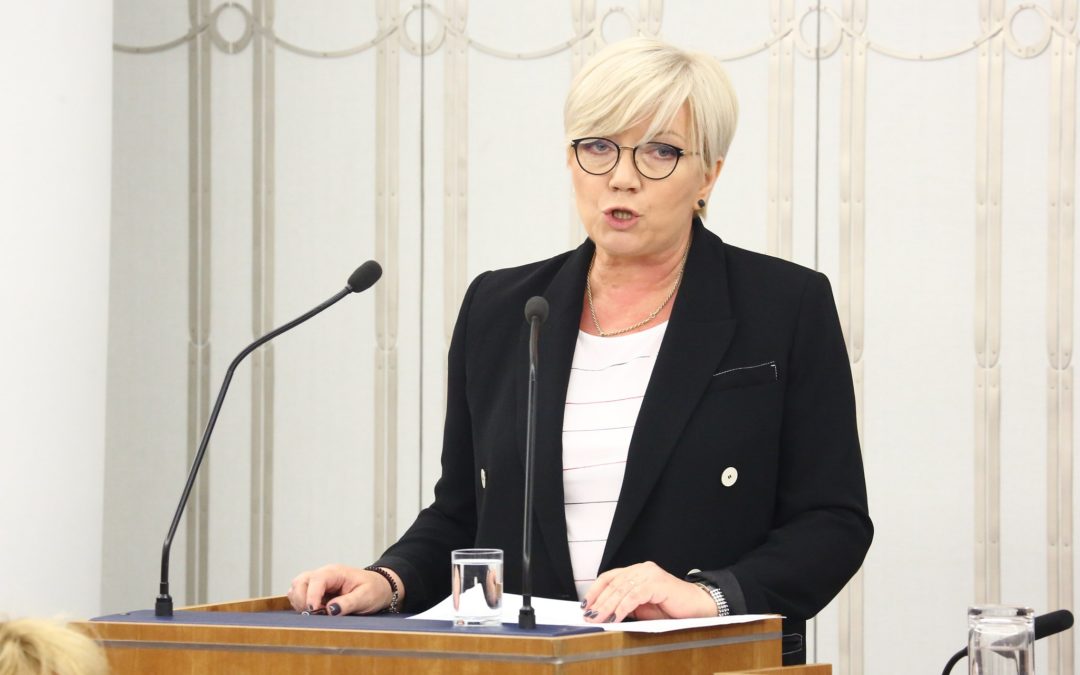The presidents of Poland and Germany’s constitutional courts have become embroiled in a war of words, with the German chief justice describing his Polish counterpart as a “puppet”, prompting an angry response.
The exchange began when the head of Poland’s Constitutional Tribunal, Julia Przyłębska, commented on a controversial recent ruling by the German Federal Constitutional Court, which effectively declared a judgement by the European Court of Justice to be invalid.
This showed that national courts, not European ones, have the “final word”, said Przyłębska, who is a close personal associate of Jarosław Kaczyński, the chairman of Poland’s ruling party and the country’s de facto leader.
Yesterday, in an interview with German weekly Die Zeit, the outgoing head of the Federal Constitutional Court, Andreas Vosskuhle, responded by saying that the Polish Constitutional Tribunal is “no longer a court to be taken seriously, but a puppet”.
Przyłębska reacted with “shock that a person in such a key position is making such comments”. His words are “scandalous” and do “not meet any standards of honest public debate”, she said, quoted by the Polish Press Agency.
Przyłębska: Skandaliczna wypowiedź prezesa niemieckiego Trybunału Konstytucyjnego nie mieści się w żadnych kanonach rzetelnej debaty publicznej. Jestem zażenowana, że osoba pełniąca tak ważną funkcję wypowiada się w taki sposób.
— PAP (@PAPinformacje) May 13, 2020
The Die Zeit article carrying Vosskuhle’s comments was part of a broader media campaign in which two German constitutional court judges defended last week’s shock decision, in which the court ruled that the European Central Bank’s (ECB) mass bond-buying to stabilise the eurozone partly violates the German constitution.
The German court’s decision drew much criticism and concern, including from European Commission President Ursula von der Leyen, who warned of possible legal action against Berlin.
But it was hailed in Poland and Hungary, whose governments have been in conflict with Brussels over the rule of law. Warsaw has argued that the EU has no right to “interfere” in member states’ judicial affairs, and has accused the ECJ of “violating Poland’s sovereignty”.
Polish Prime Minister Mateusz Morawiecki, speaking to Frankfurter Allgemeine Zeitung, called the German court’s decision “one of the most important rulings in the history of the European Union”.
Vosskuhle’s interview may have tempered some of that enthusiasm. The German judges have underlined that the ruling does not place national courts above the EU one. Rather, “our ruling says that the European Court of Justice should have more extended oversight, which I believe does not reflect the Polish government’s position”, Vosskuhle was quoted as saying by Rzeczpospolita.
Poland’s national broadcaster TVP, which is used by the government to present its narrative, echoed Przyłębska’s comments, while also labelling Vosskuhle’s comments as “hypocrisy” because the German Constitutional Court is itself a highly politicised institution.
“As opposed to Polish judges, German judges can be and are active members of political parties,” said TVP’s Berlin correspondent Cezary Gmyz.
Poland’s ambassador in Berlin has also reportedly asked Die Zeit to correct its inference that Przyłębska had greeted the German court’s ruling with great satisfaction. In fact, said the embassy’s spokesperson, she had merely drawn similarities between the Polish and German actions.
Critics of Germany’s recent ruling worry that it may bolster countries like Poland and Hungary in their opposition to the Europe’s top court. The ECJ recently ordered Warsaw to suspend its strict new disciplinary regime for judges, but the Constitutional Tribunal has ruled in favour of the government’s position.
“Member states may reform their justice systems, but they must do so without violating EU treaties,” stated European Commission Vice President Věra Jourová last month when launching the latest round of infringement proceedings against Poland, which she argued had violated the supremacy of European law.
Main image credits: Senat RP/Katarzyna Czerwińska/Flickr (under CC BY-NC-ND 2.0)

Agnieszka Wądołowska is deputy editor-in-chief of Notes from Poland. She is a member of the European Press Prize’s preparatory committee. She was 2022 Fellow at the Entrepreneurial Journalism Creators Program at City University of New York. In 2024, she graduated from the Advanced Leadership Programme for Top Talents at the Center for Leadership. She has previously contributed to Gazeta Wyborcza, Wysokie Obcasy and Duży Format.




















